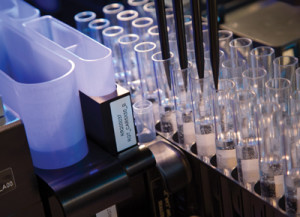Analytical and Molecular techniques are the common methods used to determine the concentration of a chemical compound or chemical element used in molecular biology, biochemistry, genetics and biophysics which generally involve manipulation and analysis of DNA, RNA, protein, and lipid. Since around 1960, molecular biologists have developed methods to identify, isolate, and manipulate molecular components in cells including DNA, RNA, and proteins. Analytical methods can be separated into classical and instrumental. Classical methods (also known as wet chemistry methods) use separations such as precipitation, extraction, and distillation and qualitative analysis by color, odor, or melting point. Classical quantitative analysis is achieved by measurement of weight or volume. Instrumental methods use an apparatus to measure physical quantities of the analyte such as light absorption, fluorescence, or conductivity. The separation of materials is accomplished using chromatography, electrophoresis or field flow fractionation methods.
There are a wide varieties of techniques used for analysis, from simple weighing (gravimetric analysis) to titrations (titrimetric) to very advanced techniques using highly specialized instrumentation. The most common techniques used in analytical chemistry are Titrimetry, electro analytical methods, spectroscopy, chromatography, gravimetric analysis, microscopy, Radio analytical chemistry. Biomedical Engineering (BME) is the application of engineering principles and design concepts to medicine and biology for healthcare purposes (e.g. diagnostic or therapeutic). The Biomedical Engineering Society has developed a list of the major specialty areas in bioengineering like Bioinstrumentation, Biomechanics, Cellular, Tissue, and Genetic Engineering, Clinical Engineering, Medical Imaging, Systems Physiology, etc.
Since around 1960, molecular biologists have developed methods to identify, isolate, and manipulate molecular components in cells including DNA, RNA, and proteins. Several techniques used in the field of molecular biology are Polymerase chain reaction, Expression cloning, Gel electrophoresis, Macromolecule blotting and probing, Arrays, the blotting techniques, ELISA. And these techniques are applicable within the fields of healthcare, pharmaceuticals and biomedical diagnostics, environmental and forensic analysis, heritage science, agricultural science and food products, industrial process development and product validation.

